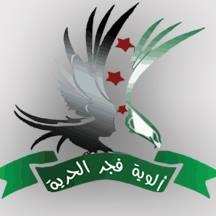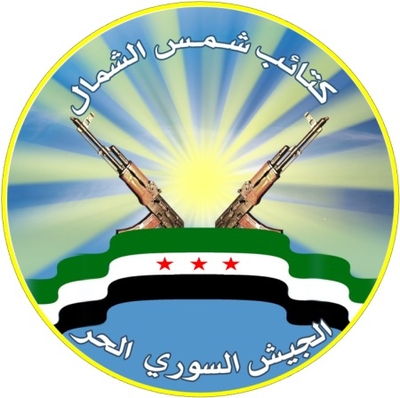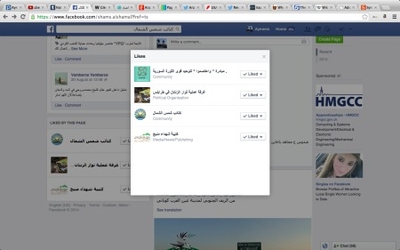
Logo of the Dawn of Freedom Brigades
One of the more noted recent trends in rebel dynamics in Syria is the weakening of the Islamic Front, widely noted last year as the most powerful rebel alliance in terms of manpower and fighting capabilities. However, the coalition was always weaker than it seemed at first sight, with one of the most pertinent questions being why the constituent groups never abandoned their own individual names and banners if they were really so united. This year, the Islamic Front has seen its constituents- particularly Ahrar al-Sham- hit by defections to the Islamic State (IS), assassinations of leaders, and fracturing on account of tensions between and within the coalition's factions. The group Liwa al-Tawheed- previously considered one of the most powerful Aleppo factions- has suffered from internal fragmentation and manpower loss, with many of its local eastern Aleppo province affiliates having become defunct but now re-emerging as break-off groups, lacking any distinct ideological program equivalent to the Islamic Front's "Project of the Ummah" that aimed for a clear assertion of the Islamic Front as a serious Islamist political force to be reckoned with.
The new rebel coalition Tajammu' Alwiya Fajr al-Hurriya ('Grouping of the Dawn of Freedom Brigades') is a case-in-point. For example, one of the constituents of this coalition is Kata'ib Shams al-Shamal ('Sun of the North Battalions'), whose official Facebook page 'likes' a page set up for the Manbij Martyrs' Battalion, a one-time Liwa al-Tawheed affiliate in the town of Manbij that has since January of this year fallen under the exclusive control of the IS, having previously been a place where IS was merely one of a number of groups in the town including local Islamic Front groups' affiliates. This points to the link between the Kata'ib Shams al-Shamal formation and the now defunct Liwa al-Tawheed affiliates it has come to supersede in the northeast of Aleppo province.

Logo of Kata'ib Shams al-Shamal: "The Free Syrian Army."

The Facebook 'likes' of Kata'ib Shams al-Shamal, including the Manbij Martyrs' Battalion.
The Dawn of Freedom Brigades coalition is of importance at the moment because it is a participant in the fight against IS in the Kobani (Ayn al-Arab) area (e.g. see this video, said to be in the countryside just to the south of the main town) that is one of the Kurdish Democratic Union Party's (PYD) self-declared autonomous cantons. The coalition is thus cooperating with the PYD's armed wing the People's Protection Units (YPG). This cooperation, as will be seen below, is something openly admitted: compare with this video* announcing the "Euphrates Volcano" joint operations room including Kata'ib Shams al-Shamal and the YPG for eastern Aleppo countryside to fight IS.
This pointedly contrasts with last year's dynamics that saw the parent organization Liwa al-Tawheed work with IS against the YPG in Aleppo province, in part contributing to severe losses for the YPG in that area. Such coordination with IS- following on from the YPG's expulsion of IS and Jabhat al-Nusra from Ras al-Ayn town in Hasakah province in mid-July- was also undertaken by other major rebel groups like Ahrar al-Sham. It was justified by many rebels at the time as necessary against a perceived 'regime agent' but was also rooted in wider Syrian Arab suspicion of Kurdish autonomy or separatist agendas. Undoubtedly the cooperation between IS and these rebel groups against the YPG allowed IS to grow.
To be sure, relations somewhat shifted at the start of this year as infighting broke out between IS and rebel groups across northern and eastern Syria: limited cooperation, for instance, was in evidence between Liwa al-Tawheed and Jabhat al-Akrad- a front-group for the YPG- in the Azaz countryside, but there was nothing on a par with rebels helping the YPG to defend a stronghold under PYD control. The current Dawn of Freedom Brigades-YPG effort in Kobani needs to be tied to a broader trend of some FSA-banner figures coming to terms with past mistakes vis-a-vis relatons with the YPG: foremost embodied in one-time Aleppo FSA Military Council head Col. Oqaidi's visit to the YPG in the Kurdish enclave of Afrin in Aleppo province in late August, reflecting a 180 degree turn from his defences of IS and anti-YPG stance in summer 2013, even as he goes on about the need for unity against the niẓam('regime').
In my view, however, this cooperation is too little, too late to lead to substantial setbacks for IS, hindered as it is also by Turkey's hostility towards the PYD on account of links with the Kurdistan Workers' Party (PKK) and Western regard for such concerns. In the long-run too, there is a problem of differing agendas: the PYD has too little interest or resources to attempt to take the fight all the way to Raqqa city, for example, being more concerned with its own proto-state project in the territory it already controls.
Below is an interview I conducted with Abu al-Layth, one of the leaders of the Dawn of Freedom Brigades (see here for the Dawn of Freedom Brigades' organizational structure).
Q: What are the factions in the Dawn of Freedom Brigades? Is it true that the factions used to be in Liwa al-Tawheed?
A: The majority of the military factions were sidelined from Liwa al-Tawheed and others beside it previously; and we do not fight with any side that has no firm decision-making on the ground.**
Q: What are your aims? Do you want a democratic state or a state in which Shari'a is the sole source of legislation?
A: We are not planning on anything for when Assad falls. We hope that there will be protection for all the peoples [of Syria] and that we will co-exist- all of the Syrian people. And it [the Syrian people] is the one that decides what it wants. We are with the Syrian people.***
Q: With protection for all sects?
A: The people decides and we came out because of the racism of Bashar al-Assad.
Q: Is there cooperation with the YPG in the Ayn al-Arab area against the IS organization?
A: Yes. We of the Dawn of Freedom Brigades- when IS launched the assault on Ayn al-Arab- sent 250 fighters to Ayn al-Arab to protect the Kurdish and Arab people in this area. And we have tried to protect the Suleyman Shah tomb**** but we will not be able to do so because of the paucity of our heavy equipment.
Q: In your opinion are the American airstrikes helping the effort against IS?
A: This is in God's hands. We are against the coalition's airstrikes because they do not target the regime which is greatly criminal. The two states [i.e. IS and the regime] compete as to who can destroy civilian life more.
Q: And is it a problem also that the strikes are targeting Jabhat al-Nusra that fights the regime?
A: No. Jabhat al-Nusra fights on all sides, but has also yielded on more than one of the fronts between it and the regime.***** Examples: the battle of Kassab; it and Ahrar al-Sham of the battle of Hama recently; it and the Islamic Front in the battle of the Industrial Area in Aleppo. I mean they have many bad things about them as well. And we as a Syrian people don't accept any organization that is neutral or against our people.
Q: So the Islamic Front also withdrew from the Industrial Area in Aleppo?
A: The reason being the weakness of the two fronts [Nusra & the Islamic Front], so the regime seized the Industrial Area. Weakness and not withdrawal: I mean retreat.
Notes
*- Others mentioned in the video include brigades that have been working with the YPG for several months now following IS' takeover of all major urban areas in Raqqa province, such as Liwa Thuwar Raqqa (ex-Nusra affiliate) and Liwa al-Jihad fi Sabeel Allah (tied to the Western-backed SMC). The cooperation originates from the fact that many members of these groups sought refuge with the YPG west of Tel Abyad. The YPG would then help these groups to reclaim some villages from IS in return for power-sharing in those localities.
**- Referring to the lack of real unity and direction with the Islamic Front.
***- The mark of a non-ideological program, also contrasting with the "Project of the Ummah" of the Islamic Front from which the Dawn of Freedom Brigades coalition has emerged.
****- The site has been under the protection of Turkish troops and IS allegedly threatened an attack in March this year if they did not withdraw within 3 days, though even if the threat had been real, it was never acted on.
*****- cf. Aron Lund's article on Jabhat al-Nusra, which notes also the consolidation of control of towns and territory in Idlib province that have followed on from at least some withdrawals.

